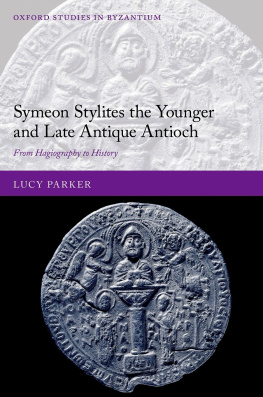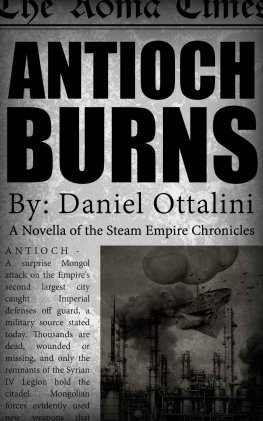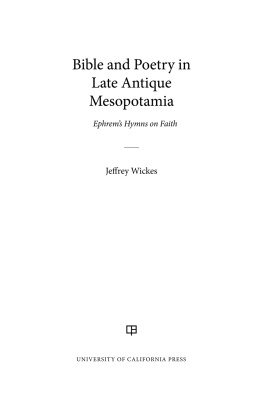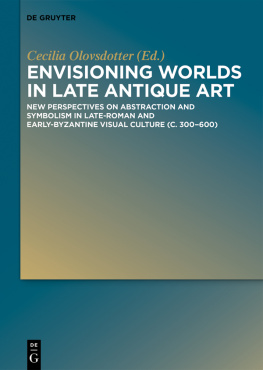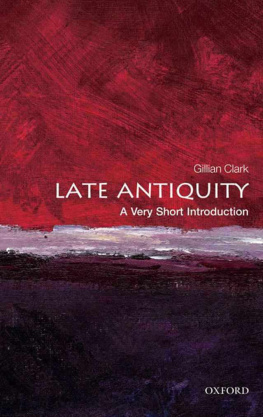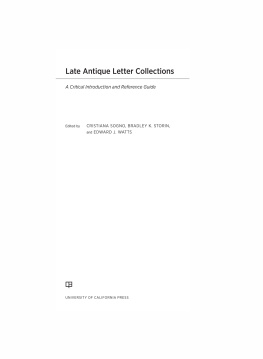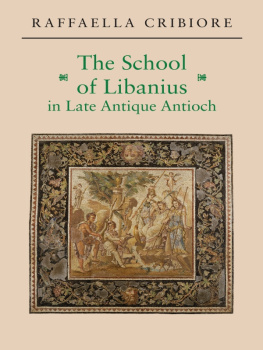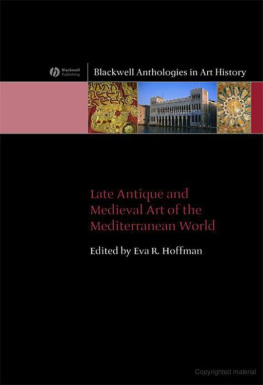Lucy Parker - Symeon Stylites the Younger and Late Antique Antioch: From Hagiography to History
Here you can read online Lucy Parker - Symeon Stylites the Younger and Late Antique Antioch: From Hagiography to History full text of the book (entire story) in english for free. Download pdf and epub, get meaning, cover and reviews about this ebook. year: 2022, publisher: OxfordUP, genre: Religion. Description of the work, (preface) as well as reviews are available. Best literature library LitArk.com created for fans of good reading and offers a wide selection of genres:
Romance novel
Science fiction
Adventure
Detective
Science
History
Home and family
Prose
Art
Politics
Computer
Non-fiction
Religion
Business
Children
Humor
Choose a favorite category and find really read worthwhile books. Enjoy immersion in the world of imagination, feel the emotions of the characters or learn something new for yourself, make an fascinating discovery.
- Book:Symeon Stylites the Younger and Late Antique Antioch: From Hagiography to History
- Author:
- Publisher:OxfordUP
- Genre:
- Year:2022
- Rating:5 / 5
- Favourites:Add to favourites
- Your mark:
- 100
- 1
- 2
- 3
- 4
- 5
Symeon Stylites the Younger and Late Antique Antioch: From Hagiography to History: summary, description and annotation
We offer to read an annotation, description, summary or preface (depends on what the author of the book "Symeon Stylites the Younger and Late Antique Antioch: From Hagiography to History" wrote himself). If you haven't found the necessary information about the book — write in the comments, we will try to find it.
Lucy Parker: author's other books
Who wrote Symeon Stylites the Younger and Late Antique Antioch: From Hagiography to History? Find out the surname, the name of the author of the book and a list of all author's works by series.
Symeon Stylites the Younger and Late Antique Antioch: From Hagiography to History — read online for free the complete book (whole text) full work
Below is the text of the book, divided by pages. System saving the place of the last page read, allows you to conveniently read the book "Symeon Stylites the Younger and Late Antique Antioch: From Hagiography to History" online for free, without having to search again every time where you left off. Put a bookmark, and you can go to the page where you finished reading at any time.
Font size:
Interval:
Bookmark:

Editorial Board
Ja Elsner Catherine Holmes
James Howard-Johnston Elizabeth Jeffreys
Hugh Kennedy Marc Lauxtermann
Paul Magdalino Henry Maguire
Cyril Mango Marlia Mango
Claudia Rapp Jean-Pierre Sodini
Jonathan Shepard
Oxford Studies in Byzantium consists of scholarly monographs and editions on the history, literature, thought, and material culture of the Byzantine world.
Church Architecture of Late Antique Northern Mesopotamia
Elif Keser Kayaalp
Byzantine Religious Law in Medieval Italy
James Morton
Caliphs and Merchants
Cities and Economies of Power in the Near East (700950)
Fanny Bessard
Social Change in Town and Country in Eleventh-Century Byzantium
James Howard-Johnston
Innovation in Byzantine Medicine
The Writings of John Zacharias Aktouarios (c.1275c.1330)
Petros Bouras-Vallianatos
Emperors and Usurpers in the Later Roman Empire
Civil War, Panegyric, and the Construction of Legitimacy
Adrastos Omissi
The Universal History of Stepanos Tarneci
Introduction, Translation, and Commentary
Tim Greenwood
The Letters of Psellos
Cultural Networks and Historical Realities
Edited by Michael Jeffreys and Marc D. Lauxtermann
Holy Sites Encircled
The Early Byzantine Concentric Churches of Jerusalem
Vered Shalev-Hurvitz
Law, Power, and Imperial Ideology in the Iconoclast Era c.680850
M. T. G. Humphreys
Byzantium and the Turks in the Thirteenth Century
Dimitri Korobeinikov
Writing and Reading Byzantine Secular Poetry, 10251081
Floris Bernard
The Byzantine-Islamic Transition in Palestine
An Archaeological Approach
Gideon Avni
Shaping a Muslim State
The World of a Mid-Eighth-Century Egyptian Official
Petra M. Sijpesteijn

Great Clarendon Street, Oxford, OX2 6DP, United Kingdom
Oxford University Press is a department of the University of Oxford. It furthers the Universitys objective of excellence in research, scholarship, and education by publishing worldwide. Oxford is a registered trade mark of Oxford University Press in the UK and in certain other countries
Lucy Parker 2022
The moral rights of the author have been asserted
First Edition published in 2022
Impression: 1
All rights reserved. No part of this publication may be reproduced, stored in a retrieval system, or transmitted, in any form or by any means, without the prior permission in writing of Oxford University Press, or as expressly permitted by law, by licence or under terms agreed with the appropriate reprographics rights organization. Enquiries concerning reproduction outside the scope of the above should be sent to the Rights Department, Oxford University Press, at the address above
You must not circulate this work in any other form and you must impose this same condition on any acquirer
Published in the United States of America by Oxford University Press
198 Madison Avenue, New York, NY 10016, United States of America
British Library Cataloguing in Publication Data
Data available
Library of Congress Control Number: 2021952671
ISBN 9780192865175
ebook ISBN 9780192688798
DOI: 10.1093/oso/9780192865175.001.0001
Printed and bound in the UK by TJ Books Limited
Links to third party websites are provided by Oxford in good faith and for information only. Oxford disclaims any responsibility for the materials contained in any third party website referenced in this work.
For my parents
This book began its life as an Oxford D.Phil. thesis. I am very grateful to the Arts and Humanities Research Council for funding my doctorate. I finished the book while working as a British Academy Postdoctoral Fellow, still in Oxford, and would like to thank the British Academy for their support of my research. The book is therefore a product of the rich and stimulating environment of the History Faculty in Oxford. I am grateful to all the students and tutors in Late Antique and Byzantine Studies with whom I have discussed Byzantine religion over the years, and to David Taylor for inspiring tuition in Syriac. I cannot imagine a better place to have worked on this project. Of many debts, two stand out. I was first introduced to Byzantine history as an undergraduate student by the late Mark Whittow. Mark was a wonderfully engaging and kind tutor, and remained a source of support, wisdom, and good humour long after my student days. Like so many others, I miss him greatly. I am also very indebted to my supervisor, Phil Booth. Phil has been unfailingly generous and supportive to me, and his advice has greatly improved my work. Among many kindnesses, he took the time to teach me the basics of Coptic.
I am very grateful to everyone who has helped me in the process of converting my thesis into a monograph. My doctoral examiners, Averil Cameron and Vincent Droche, gave me very helpful suggestions and constructive criticism; I greatly appreciate their support. After finishing my doctorate, I began working on the Stories of Survival project in Oxford led by John-Paul Ghobrial. John-Paul has been a wonderful mentor and friend, and I have learned a great deal from him. I would also like to thank Elizabeth Jeffreys, who was very encouraging when I first considered publishing this book with Oxford Studies in Byzantium. I am very grateful to Charlotte Loveridge and Cathryn Steele, my editors, and to all the team at Oxford University Press for all their help throughout the process of publication.
I owe a great deal to the support of my friends and family. I cannot name them all here, but would especially like to thank Otone, my house mate throughout most of the time I worked on this project, for her unfailing friendship, support, and enthusiasm about stylites. It has been a joy to talk about history, religion, and the ancient world with Anastasia, Rosie, and Laura. My husband, Paul, has been a constant source of encouragement. We first met each other a few months before I finished my doctorate. Several years later, we were in Scotland on our honeymoon when I found out that my book had been accepted by OUP! I am so grateful for the love and happiness that he has brought into my life.
My greatest debt is to my parents, Jo and Robert, for the support of all kinds which they have given me over the years. I could not have written this book without them, and I dedicate it to them with love and gratitude.
Any author of a book treating an area which used a range of languages faces difficult decisions in terms of transliteration conventions. I have tried to follow some clear principles, but, like the scribes of Syriac manuscripts, I beg the reader to forgive any mistakes. For names which have common English equivalents, I have used these (thus John not Ioannes/Yuanon, George not Georgios/Giwargis, Cyril not Kyrillos). When a name does not have a widely used English equivalent, I typically use a simplified Greek transliteration (Amantios, Dorotheos, Evagrios Scholastikos). I do, however, use a Latinized transliteration for authors who wrote in Latin (Marcellinus comes), for emperors (Tiberius and Heraclius), and for martyrs whose names are paired with common English names (thus Cosmas and Damian, not Kosmas and Damianos). For place names, I typically use the commonly known English version. For places with both Syriac/Arabic and Greek names, I use the name most widely used in scholarly literature. For obscure place names mentioned in hagiographies, I use a simplified transliteration from Greek.
Font size:
Interval:
Bookmark:
Similar books «Symeon Stylites the Younger and Late Antique Antioch: From Hagiography to History»
Look at similar books to Symeon Stylites the Younger and Late Antique Antioch: From Hagiography to History. We have selected literature similar in name and meaning in the hope of providing readers with more options to find new, interesting, not yet read works.
Discussion, reviews of the book Symeon Stylites the Younger and Late Antique Antioch: From Hagiography to History and just readers' own opinions. Leave your comments, write what you think about the work, its meaning or the main characters. Specify what exactly you liked and what you didn't like, and why you think so.

